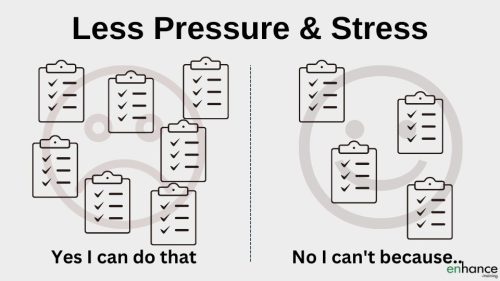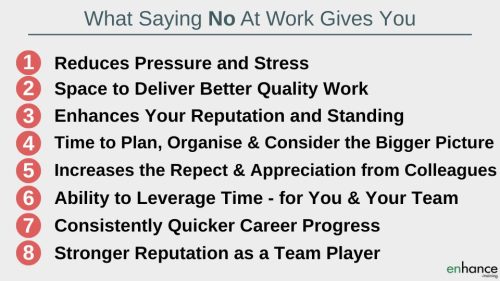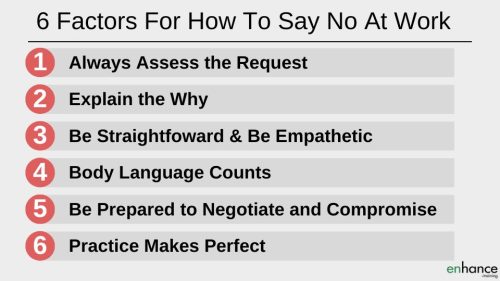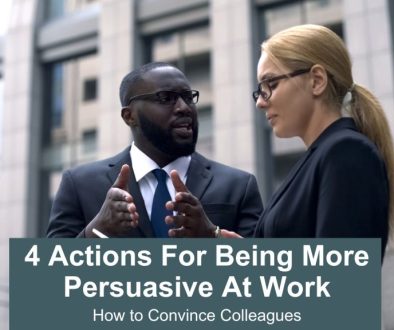What Saying No at Work Gives You and How to Say No at Work

Saying no at work feels hard, difficult, emotional, and fraught with potential danger to relationships and career prospects. If you don’t say no at work, you will be overrun with work, stressed, unhappy and risk much more serious damage to relationships and career prospects.
How to say no at work is the key to being able to deliver good quality work without damaging those important relationships with colleagues and your manager.
I am taking you through what saying no at work gives you – 8 very important benefits to you and then these 6 factors for how to say no at work without annoying others
What Saying No at Work Gives You and How to Say No at Work
- Always assess the request
- Explain the Why
- Be Straightforward & Be Empathetic
- Body language counts
- Be Prepared to Negotiate and Compromise
- Practice Makes Perfect
Watch on YouTube
Listen on Podcast
Before we cover how to say no at work, let talk about why you should say no at work. This will help you in having the courage to say no at work more often and practice at getting better at saying no at work without upsetting colleagues.
Let’s go through What saying no at work gives you:
Firstly
you are going to be under less pressure and be a lot less stressed at work. Saying no at work reduces the number of tasks and projects you need to fit in to sensible levels. Saying no at work creates boundaries to how long you stay in the evenings and how many weekends you work.
Secondly
saying no at work gives you space to deliver much better quality work on the tasks and projects you do work on. You are not spread too thin, trying to do a bit of everything, but not enough of anything. Maintaining your ability to do good work relies on how well you say no at work – because you get more requests when you have a reputation for being good.
Thirdly
saying no before you end up with too much work enhances your reputation and standing at work. You demonstrate you can judge and manage your commitments and maintain the quality of your performance. Very important qualities in any worker.
Fourth
saying no at work gives you the time to plan, organise, consider the bigger picture and all the other factors that go into choosing what to focus your time on for the benefit of your team and organisation. Don’t underestimate how important making this time is for how well you can deliver overall in your role.

Fifth
saying no at work in the right way increases the respect and appreciation you get from your colleagues and your manager. You are not perceived as a yes person, a walkover or a dumping ground for the boring tasks. You have a better chance of doing valuable and higher profile work and getting the credit for doing a good job.
Sixth
saying no at work gives you the ability to leverage your time, and if you manage a team, leverage your team’s time. Leveraging time is about increasing the value of your output and your team’s output for every hour worked. This is key to progressing your career at any level.
Seventh
saying no at work allows you to progress your career quicker and more consistently for all the reasons we have just gone through. That is more satisfaction, more development, a higher standing, nicer holidays and everything else that comes wtih promotion and progression.
Eighth
surprisingly, I think saying no at work helps you build a stronger reputation as a team player. This is because you deliver on the work you do. You are less likely to let team members down because you have the time and energy to do a good job. Your realism and honesty outweigh the annoyance that you have to say no at times.
I really don’t think anyone can afford to say yes at work when they genuinely can’t or shouldn’t take on extra work or less important work. Saying yes when you know you should say no is very costly to you in the longer term. Don’t do it. Learn how to say no without annoying or upsetting the person asking.

How to say no at work
is a skill that can and should be learnt and practiced by everyone. For those of you that are very relationship focused at work, this applies doubly to you. Saying yes and not being able to deliver well is a lot more damaging to relationships than saying no in the first place.
The first step is always assess the request
Even if it is a slam dunk no, think about what is being asked, what the impact of saying no will be on the other person, on you, and on the wider business. Just going through this thinking process and considering the request demonstrates your respect for the person asking. No-one likes a person saying no without thinking through the request.
Ask questions about the request so you can assess the priority and importance of the request compared to your current workload. Understand the context of request and how it impacts other tasks and activities within the business before making a decision.

Next in How to say not at work is Explain the why
When you have made your initial decision, tell the requester and then explain why. Provide them the context of your decision and the impact of saying no to their request.
“I am very sorry, I don’t think I can say yes to your request. I have 4 very important projects that I and my team are working on with tight deadlines. We won’t be able to give your request the attention it deserves. Saying yes would also impact how well we can deliver on these 4 projects which in my understanding remain the top priorities for my team. I am sorry. Perhaps you can speak to …”
You decision should be backed up by reason and logic and a solid business case. You should not say no if you don’t want to do the work, don’t enjoy it or for other non-business reasons.
Always provide the why to your decision when you say no at work.
A big factor in how to say no at work is being
Straightforward and being Empathetic
How you say no counts for a lot in maintaining good relationships. Put yourself in their shoes and demonstrate you understand what saying no means for them too.
Be honest with your reasons and get straight to the point. You want to make sure the other person is clear as to why you are saying no and understands the reasons behind the choice you have made. If you offer lame excuses or don’t share why you can’t say yes – they will push back, feel you aren’t being reasonable, are not a team player etc. A sure way to upset and annoy them.
Make your reasons for saying no clear and demonstrate the business case for saying no. Show you understand the position – you saying no – puts them in. Try to help them. This might be helping them in key parts of their project rather than all of it or organising help from another part of the business.
Be clear and be empathetic when you are saying no at work.
Another factor in how to say no at work is Body language counts
Managing your tone of voice and body language while saying no at work is important. You should say no confidently and as neutrally as possible.
If you are not confident with your voice and how you hold yourself, the other person is a lot more likely to challenge your decision and reasoning behind your decision, even if changing your decision is not in the best interests of the company. So be confident when saying no and explaining why.
If you convey happiness, excitement or too much positive emotion when saying no, they you risk really upsetting the individual. They might think – Why are they so excited to be saying no? Are they deliberately trying to offend me? You absolutely don’t want this response.
Equally, if you say no with a lot of reluctance, regret or other similar emotions, the other person is much more likely to try to change your mind. This increases the time spent saying no which is not helpful to either party.
Keep your tone of voice and body language confident and as neutral as possible.
The next step in how to say no at work is being Prepared to Negotiate and Compromise
Most of the time, when you initially say no, there will be a period of negotiation. The other person wants to understand your priorities and workload and you want to understand how important the request is and the impact of saying no or yes.
Don’t be afraid to negotiate with your manager or more senior staff members when they ask you to do something. Make the time to understand the impact of your decision on what they are asking and your current workload. This will help when you are negotiating. Try to avoid being stuck between two more senior members of staff asking you to do tasks or projects – get them talking directly to each other.
Being a team player is about understanding, negotiating and reaching a sensible compromise that best helps the team. An example of compromise is agreeing to do key parts of the project that make best use of your skills, but not do the other parts of the project that other staff members can do equally well.
Be prepared to negotiate and compromise.
Finally, a key factor in how to say no at work is practicing saying no
Saying no well is a skill. To be good at saying no, you must practice to get better. Practice:
- How you assess the request and demonstrate your understanding of both parties’ positions
- Practice explaining the why of your decision so it is clear and backed by a solid business case
- Be straight forward and empathetic in how you say no at work
- Practice how you use your tone of voice and body language to reinforce your decision and reduce the time spend negotiating
- Practice negotiating and reaching compromises that work for you and the other party.
Saying no at work is a skill so practice. Becoming good at how to say no at work without upsetting or offending the other person is a great skill to have.
in summary
Saying no at work is a vital skill to develop. Learning how to say no at work is part of being a good team player. Learn how to say no well to keep your colleagues happy with you and for you to enjoy being at work and have manageable levels of stress and pressure.
The key factors in how to say no at work are:

Saying not at work in a diplomatic and empathetic way is such a huge enabler of your and your team’s success. Saying no at work reduces your stress levels, the amount of things you need to deliver on while increasing your focus and your quality of work. Everyone wins when you choose the right time and occasion to say no at work (and say yes to additional work).
Learn how to say no well so you don’t feel as emotionally charged when you do say no.






